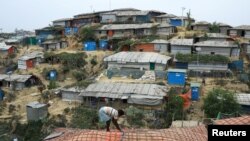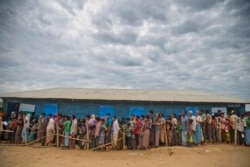Conditions in Myanmar are far too dangerous for the safe, dignified return of hundreds of thousands of Rohingya refugees who have fled to Cox's Bazar, Bangladesh, to escape violence and persecution in their home country, according to a report by the U.N. Office of the High Commissioner for Human Rights.
More than 730,000 Rohingya refugees are living in squalid, overcrowded camps in Cox's Bazar. While conditions in Bangladesh remain dire, U.N. officials say the situation in Myanmar's northern Rakhine state is worse and far more threatening.
U.N. Deputy High Commissioner for Human Rights Kate Gilmore presented the report to the U.N. council. She says Rohingya Muslims in northern Rakhine state face serious discrimination, and continuous, systematic violations of their fundamental rights and freedoms.
"We continue to receive and can verify reports from a variety of sources, including reports on sexual and gender-based violence, that human rights violations continue, allegedly committed by members of the security forces," Gilmore said. "The conditions conducive for refugee return simply do not exist."
Security forces attacked and burned Rohingya homes and shops in several townships in May, Gilmore reported. She said her office has received reports of disappearances, and of people being subjected to torture and other forms of abuse in detention.
In addition, she said, Rohingya Muslims are denied basic services to health, education and jobs, and many have been stripped of their property and identity papers, essentially rendering them stateless.
Gilmore called on the Myanmar government to reverse this situation and to end the statelessness of the Rohingya. She said it is unlikely the refugees will return to their place of origin until their citizenship status is recognized.
Reaction in Myanmar
Myanmar's Ambassador to the U.N. in Geneva, Kyaw Moe Tun, says human rights awareness is promoted throughout his country. He called the U.N. report misleading, incomplete and full of unverified allegations that distort the truth.
The repatriation process must begin as soon as possible to resolve the humanitarian situation, he said, adding that Myanmar has been ready to receive people since January 2018, when his country and Bangladesh signed a repatriation agreement.
Myanmar has presented Bangladesh with a list of more than 1,200 verified displaced persons who repeatedly expressed their desire to return, he said.
Earlier this year, Bangladesh's Foreign Secretary Shahidul Haque told the U.N. Security Council "not a single Rohingya has volunteered to return to Rakhine due to the absence of conducive environment there."





